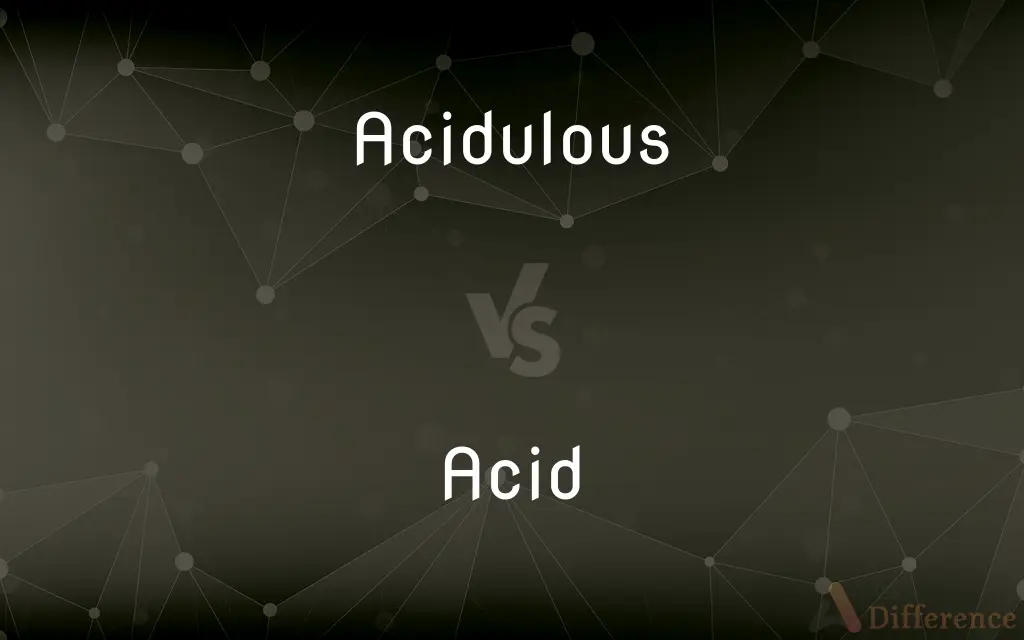Acidulous vs. Acid — What's the Difference?
By Tayyaba Rehman & Fiza Rafique — Updated on March 13, 2024
Acidulous describes a taste or smell that is slightly acidic or sour, while acid refers to a substance with a pH less than 7, capable of donating a proton.

Difference Between Acidulous and Acid
Table of Contents
ADVERTISEMENT
Key Differences
Acidulous refers to a mildly sour or tart taste or smell, often used to describe food or drinks that have a sharp but pleasant flavor. Whereas acid denotes a class of substances that show, in water, a pH less than 7, are capable of turning blue litmus paper red, and can react with bases to form salts.
Acid substances are characterized by their ability to donate protons (H+) in reactions, a property that is fundamental to their behavior in chemical reactions. On the other hand, the term acidulous is more commonly used in culinary and sensory contexts rather than in strict chemical terms.
While acids are crucial in various industrial, scientific, and manufacturing processes, acidulous flavors are appreciated for their refreshing qualities in food and beverages. In contrast, acids have a broader application, including in cleaning products, as electrolytes in batteries, and in the synthesis of materials.
Acidulous sensations are often sought after in gastronomy to balance flavors and stimulate the palate. Acid, however, plays a vital role in biochemistry and physiology, including in the digestive system where stomach acid (hydrochloric acid) is essential for digestion.
The distinction between acidulous and acid also extends to their usage in language and descriptions. Acidulous can convey a nuanced, subtle taste quality, while the use of acid often implies a more pronounced, sometimes harsh, chemical nature or taste.
ADVERTISEMENT
Comparison Chart
Definition
Slightly acidic or sour in taste or smell.
A substance with a pH less than 7, capable of donating a proton.
Usage in Context
Often used to describe food and drinks.
Used in scientific, industrial, and culinary contexts.
Sensory Perception
Mildly sour or tart, generally pleasant.
Can range from sour to corrosive, depending on concentration.
Chemical Behavior
Not specifically related to chemical properties.
Defined by the ability to donate protons (H+) in reactions.
Examples
Acidulous fruits like berries or citrus.
Hydrochloric acid, acetic acid, sulfuric acid.
Compare with Definitions
Acidulous
Slightly Sour
The acidulous flavor of the vinaigrette added a refreshing twist to the salad.
Acid
Proton Donor
Acids, by definition, donate protons during chemical reactions.
Acidulous
Tart
He enjoyed the acidulous taste of green apples.
Acid
Corrosive Substance
Safety gear is essential when handling strong acids to prevent burns.
Acidulous
Mildly Acidic
The acidulous nature of the beverage made it exceptionally thirst-quenching.
Acid
Sour Taste
The acid in lemons is what gives them their characteristic sour taste.
Acidulous
Sharply Flavorful
The chef's signature dish is known for its acidulous undertones that tantalize the palate.
Acid
Chemical Reactant
The acid was added to the base to neutralize it and form a salt and water.
Acidulous
Pleasantly Sharp
The acidulous aroma of freshly cut lemons filled the kitchen.
Acid
PH Less Than 7
The solution turned the litmus paper red, indicating it was an acid.
Acidulous
Slightly sour in taste or in manner.
Acid
An acid is a molecule or ion capable of either donating a proton (i.e., hydrogen ion, H+), known as a Brønsted–Lowry acid, or, capable of forming a covalent bond with an electron pair, known as a Lewis acid.The first category of acids are the proton donors, or Brønsted–Lowry acids. In the special case of aqueous solutions, proton donors form the hydronium ion H3O+ and are known as Arrhenius acids.
Acidulous
Slightly sour; sub-acid; sourish.
Acid
A substance with particular chemical properties including turning litmus red, neutralizing alkalis, and dissolving some metals; typically, a corrosive or sour-tasting liquid of this kind.
Traces of acid
Trees were exposed to mixtures of heavy metals, acids, and overdoses of nutrients
Acidulous
(figurative) Sharp; caustic.
Acid
A molecule or other species which can donate a proton or accept an electron pair in reactions.
Acidulous
Containing carbonic acid.
Acidulous mineral waters
Acid
The drug LSD
A bad acid trip
She didn't have a clue the sweet had acid in it
Acidulous
Slightly sour; sub-acid; sourish; as, an acidulous tincture.
Acid
Containing acid or having the properties of an acid; having a pH of less than 7.
Acid soils
Acidulous
Tasting sour like acid
Acid
Sharp-tasting or sour
Acid fruit
Acid
(of rock, especially lava) containing a relatively high proportion of silica
The magma may start off fairly basic and end up at the close of the eruption much more acid
Acid
Any of a class of substances whose aqueous solutions are characterized by a sour taste, the ability to turn blue litmus red, and the ability to react with bases and certain metals to form salts.
Acid
A substance that yields hydrogen ions when dissolved in water.
Acid
A substance that can act as a proton donor.
Acid
A substance that can accept a pair of electrons to form a covalent bond.
Acid
A substance having a sour taste.
Acid
The quality of being sarcastic, bitter, or scornful
Wrote with acid about her first marriage.
Acid
(Slang) See LSD1.
Acid
Of, relating to, or containing an acid.
Acid
Having a high concentration of acid.
Acid
Having the characteristics of an acid.
Acid
Having a pH of less than 7.
Acid
Having a relatively high concentration of hydrogen ions.
Acid
(Geology) Containing a large proportion of silica
Acid rocks.
Acid
Having a sour taste.
Acid
Biting, sarcastic, or scornful
An acid wit.
An acid tone of voice.
Acid
Sour, sharp, or biting to the taste; tart; having the taste of vinegar.
Acid fruits or liquors
Acid
(figuratively) Sour-tempered.
Acid
Of or pertaining to an acid; acidic.
Acid
(music) Denoting a musical genre that is a distortion (as if hallucinogenic) of an existing genre, as in acid house, acid jazz, acid rock.
Acid
A sour substance.
Acid
(chemistry)
Acid
Any compound which yields H+ ions (protons) when dissolved in water; an Arrhenius acid.
Acid
Any compound that easily donates protons to a base; a Brønsted acid.
Acid
Any compound that can accept a pair of electrons to form a covalent bond; a Lewis acid.
Acid
Any corrosive substance.
Acid
LSD, lysergic acid diethylamide.
Acid
Sour, sharp, or biting to the taste; tart; having the taste of vinegar: as, acid fruits or liquors. Also fig.: Sour-tempered.
He was stern and his face as acid as ever.
Acid
Of or pertaining to an acid; as, acid reaction.
Acid
A sour substance.
Acid
One of a class of compounds, generally but not always distinguished by their sour taste, solubility in water, and reddening of vegetable blue or violet colors. They are also characterized by the power of destroying the distinctive properties of alkalies or bases, combining with them to form salts, at the same time losing their own peculiar properties. They all contain hydrogen, united with a more negative element or radical, either alone, or more generally with oxygen, and take their names from this negative element or radical. Those which contain no oxygen are sometimes called hydracids in distinction from the others which are called oxygen acids or oxacids.
Acid
Any of various water-soluble compounds having a sour taste and capable of turning litmus red and reacting with a base to form a salt
Acid
Street name for lysergic acid diethylamide
Acid
Harsh or corrosive in tone;
An acerbic tone piercing otherwise flowery prose
A barrage of acid comments
Her acrid remarks make her many enemies
Bitter words
Blistering criticism
Caustic jokes about political assassination, talk-show hosts and medical ethics
A sulfurous denunciation
Acid
Containing acid;
An acid taste
Common Curiosities
How do acids react in chemical processes?
Acids donate protons in reactions, which can lead to the formation of salts when reacted with bases.
What are some examples of acid substances?
Examples include hydrochloric acid, acetic acid, and sulfuric acid.
Can the term acidulous be used in chemistry?
Acidulous is rarely used in strict chemical contexts; it's more common in culinary or sensory descriptions.
Can acidulous foods affect dental health?
While mildly acidulous foods are generally safe, excessive consumption can affect tooth enamel.
What makes a substance acidulous in taste?
A mild concentration of acidic compounds contributes to an acidulous taste.
What defines an acidulous taste?
An acidulous taste is slightly acidic or sour, often considered pleasant and refreshing.
What role do acids play in the body?
They are essential for digestion, like stomach acid, and in metabolic processes.
How do acidulous flavors benefit food?
They can balance dishes, add complexity to flavors, and stimulate the appetite.
Are all acids harmful to humans?
Not all; the toxicity depends on the acid's concentration and nature. For example, citric acid is widely consumed in fruits.
Do acids always taste sour?
Yes, sourness is a key taste characteristic of acids, though the intensity varies.
What's the significance of pH in defining acids?
pH measures the acidity level, with values below 7 indicating acidic substances, crucial for many scientific applications.
How are acids used in cleaning products?
They can dissolve mineral deposits, remove rust, and clean surfaces by reacting with bases.
Can an acid be both corrosive and consumable?
Yes, depending on its concentration and form, like citric acid in fruits versus concentrated citric acid.
Is vinegar considered acidulous or an acid?
Vinegar is an acid (acetic acid), but its flavor can be described as acidulous in culinary contexts.
How do acidulous and acid flavors differ in perception?
Acidulous flavors are perceived as mildly tart and pleasant, while acids might have a stronger, sour taste.
Share Your Discovery

Previous Comparison
Emic vs. Etic
Next Comparison
Haylike vs. HayAuthor Spotlight
Written by
Tayyaba RehmanTayyaba Rehman is a distinguished writer, currently serving as a primary contributor to askdifference.com. As a researcher in semantics and etymology, Tayyaba's passion for the complexity of languages and their distinctions has found a perfect home on the platform. Tayyaba delves into the intricacies of language, distinguishing between commonly confused words and phrases, thereby providing clarity for readers worldwide.
Co-written by
Fiza RafiqueFiza Rafique is a skilled content writer at AskDifference.com, where she meticulously refines and enhances written pieces. Drawing from her vast editorial expertise, Fiza ensures clarity, accuracy, and precision in every article. Passionate about language, she continually seeks to elevate the quality of content for readers worldwide.














































